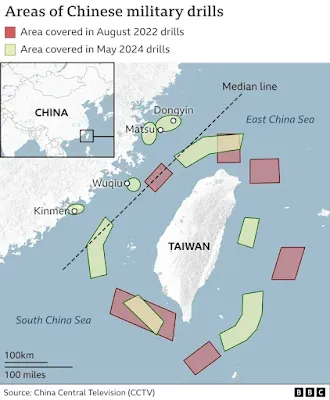 | ||
| Drills China is conducting around Taiwan have been dubbed a "severe punishment" for "separatist acts." |
China's military has begun two days of military drills surrounding Taiwan, referring to them as a "severe punishment" for the self-governing island's "separatist deeds."
Three days have passed since President William Lai took office, during which he urged China to cease its threats against the island and acknowledge its democratic existence.
Taiwan considers itself to be separate from China, which views it as a province that broke away and would eventually come under Beijing's authority.
The Chinese drills were denounced by Taiwan's defense minister as "irrational provocations."
According to its defense ministry, Taipei sent out ground, naval, and aircraft forces to "protect the [island's] sovereignty."
According to Taiwanese military experts, Thursday's drills simulated a full-scale attack instead of an economic blockade for the first time.
According to maps made public by China's People's Liberation Army (PLA), the exercises were conducted around the main island and, for the first time, also targeted the Taipei-controlled islands of Kinmen, Matsu, Wuqiu, and Dongyin, which are near the Chinese coast.
East of Taiwan, where a military outpost has long been on the untamed east coast across a mountain range, was also a part of the maneuvers.
Much of Taiwan's fortified military infrastructure, including a massive underground airbase nestled beneath a mountain close to Hualien, is situated along this coast. It is also a natural resupply route and near to the southern islands of Japan.
China intends to demonstrate to Taipei that its east is now open to Chinese attack and to the Americans that any attempt to restock or re-enforce Taiwan from the east is susceptible to Chinese missile attacks and naval assault by deploying air and naval patrols to Taiwan's east.
In order to assess its forces' "combined real fighting capabilities," the PLA declared that its exercises centered on coordinated sea-air combat-readiness patrols, targeted precision strikes on important targets, and integrated operations both inside and outside the island.
According to military expert Chieh Chung, who was quoted by Taiwanese media, the goal of the current drill is to "simulate a full-scale armed invasion of Taiwan."
Over the past year, China has practiced surrounding Taiwan with fighter jets and navy ships on multiple occasions. Prior to Mr. Lai's inauguration, Taipei has reported an increase in incursions into Taiwanese airspace and waterways.
Following a historic visit by US House Speaker Nancy Pelosi, China conducted its first "encirclement" operation in August 2022, emulating a blockade of Taiwan's main island with ships, planes, and missile strikes.
The drills on Thursday, according to the PLA, were a "stern warning against the intervention and provocation by external forces and a powerful penalty for the separatist acts of Taiwan independence forces."
The drills, according to China's foreign ministry, are a "necessary and lawful move" to protect national sovereignty.
Taiwan is an unalienable portion of China's land, I must emphasize. This is the actual status quo as well as a reality based on history. This will not alter in the foreseeable future. Taiwan independence is destined to fail, stated Wang Wenbin, the spokesperson.
Last Monday, during his inaugural speech, Mr. Lai urged China to "quit threatening Taiwan."
Beijing condemned the statement, calling Mr. Lai "disgraceful" according to Foreign Minister Wang Yi.
Beijing insisted that "Taiwan is part of China" in a statement following Mr. Lai's election victory in January of last year. It has also consistently turned down Mr. Lai's requests for discussions.
Beijing has called Mr. Lai a "troublemaker" and "separatist" in the past due to comments he made in favor of Taiwanese independence.
The drills on Thursday, according to Taiwan's defense ministry, "show [Beijing's] militaristic mentality."
It said, "Chinese ships and aircraft have been persistently harassing international peace and stability in recent years."
According to Taiwan's presidential office, China's "use of unilateral military provocations to harm Taiwan's democracy and freedom" is "regrettable."
Taiwan's goal of preserving cross-strait peace, according to the Mainland Affairs Council, which is in charge of managing ties with China, has not altered.
Spokesman Liang Wen-chieh stated, "Beijing should recognize that its intimidating tactics will not win hearts and minds."
Even while China and Taiwan are still business partners, they no longer have an official communication channel, and Taiwan is not recognized diplomatically by much of the world whereas China is.
According to analysts, under Xi Jinping, who has emphasized time and time again that "reunification" will occur—most notably in December, just weeks before Taiwan's election—Bejing's pronouncements have grown much louder and more unwavering.
China's military maneuvers around Taiwan have so far remained in the gray area and have not amounted to an invasion.
According to analysts speaking to the BBC, China is attempting to undermine its opponent over an extended period of time through the use of grey zone warfare methods, which is precisely what it is doing with Taiwan.
China and Taiwan - the basics
- Why are relations between China and Taiwan so bad? China wants that the self-governing island be united with the mainland, even if it means using force, since it considers the island to be a part of its territory. Taiwan considers itself unique.
- What kind of government exists in Taiwan? The island boasts democratically elected leaders, its own constitution, and approximately 300,000 active military personnel.
- Who is aware of Taiwan? Taiwan is recognized by relatively few nations. Instead, the majority recognize the Beijing-based Chinese government. Although the US and Taiwan do not have formal diplomatic ties, there is a statute requiring the US to give Taiwan the ability to defend itself.

